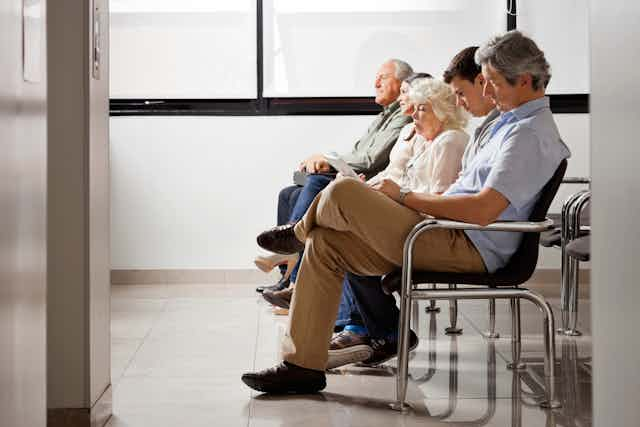What do patients really think of the NHS – and those who work for it? As language experts, that was the question my colleague Gavin Brookes and I set out to answer when NHS England tasked us with making sense of comments that patients leave online. It was no easy task – we collected a total of 228,000 comments from the NHS Choices website, coming in at a huge 29m words. Our findings have now been published in the BMJ and as a book.
Using computer software to detect the most common uses of language, and then analysing certain types of comment in detail, we spent three years working on the data. And it’s taught me more about what it means to be human than any other project I’ve been involved with. It also reveals how some staff, such as surgeons, are almost universally praised, while others, particularly receptionists, unfairly take the flak when the system breaks down.
The language used reveals that patients like predictability – they have a set of expectations and are generally happy if they’re met. They appreciate fair play and quietly monitor the order in which people in the waiting room are seen. They hate having to give details about their health to anyone but the doctor. And they’re extremely attuned to the nuances of social politeness: perceived slights, not getting smiled at, being spoken over, a cold demeanour.
Indeed, what patients described thousands of times as “attitude” tends to be at the heart of the majority of complaints about the NHS, followed by difficulties getting appointments, and spending too long in the waiting room – “took forever” was one of the phrases that came up, again and again.
Interestingly, complaints about the technical ability of staff to make us well are less common, suggesting that the NHS is mostly doing a good job, but is overstretched and struggling to meet demand.
Not all staff are equal
Staff are not evaluated equally, however. We examined words people used to evaluate different types of NHS staff, separating them into positive – “great”, “brilliant”, “helpful”, for example – and negative – “awful”, “rude”, “useless”. The chart below shows the ratio of these positive (blue) and negative (red) words when applied to different staff members.

The good news for the NHS is that there is more blue than red in the chart, and some staff members do especially well, with surgeons, dentists and paramedics being evaluated positively 95% of the time. Moving down the chart, however, receptionists fare less well, only attracting 57% of the positive words. Indeed, when giving talks about our work, this chart provokes the most discussion, particularly that final column. Everyone seems to have their “horrible receptionist” story.
And so perhaps we should conclude that the NHS should give surgeons, dentists and paramedics pay rises and send receptionists on training courses. But look closely at the patient comments and a different picture emerges.
The language used suggests that surgeons tend to receive positive feedback because many people are impressed by the job they do: “My surgeon was someone I could trust with my life,” wrote one patient. Surgeons, therefore, were most likely to be called “outstanding”, while midwives, who are responsible for bringing life into the world, were regularly “exceptional”.

Dentists, who came second in our comparison, also attracted strong praise, consistently being called “great”. The broader language used to describe dentists was also revealing, though. Many patients wrote about having a dentist phobia but then being pleasantly surprised when the actual visit was painless. The good feedback dentists received, then, was often related to a sense of relief.
Nurses also scored well (92% positive evaluations) but didn’t attract the most strongly positive words, and were instead often called “lovely”.
‘Rude’?
Receptionists, however, attracted a slew of negative words, from “useless”, “rude” and “unprofessional” to “unhelpful”, “patronising” and “aggressive”.
Looking at the comments in more detail, it was clear that this was often because patients were annoyed that they couldn’t provide appointments quickly or didn’t answer the phone immediately. Some patients thought receptionists were nosy, with one writing: “Receptionists talk as if they are doctors asking what’s wrong?” The perceived frosty nature of some receptionists also attracted negative attention.
While receptionists allocate appointments and are seen as “gate keepers”, they are often managing computerised appointment systems they didn’t design. Consequently, they often unfairly take the flak when there aren’t enough appointments, things start running late, or the system breaks down. Having to tell people “no” is a thankless task – but someone has to do it.
Perhaps it’s no wonder that receptionists aren’t always able to present a composed and friendly face to the next person in the line. And with many surgeries recently requiring receptionists to engage in triage (asking patients what’s wrong with them so the most serious cases can be prioritised) they’re getting the blame from patients who believe they’re being nosy, intrusive or obstructive.
We view the criticism of receptionists as more likely to be a sign that the NHS is under strain and urge patients not to take the questions and delays personally, to cut their receptionists some slack, and focus their criticism of the NHS at the decision makers, not the people who are simply paid to give out the bad news. Our analysis showed us that patients in England value politeness highly. We encourage them to set the example when encountering harried staff.

